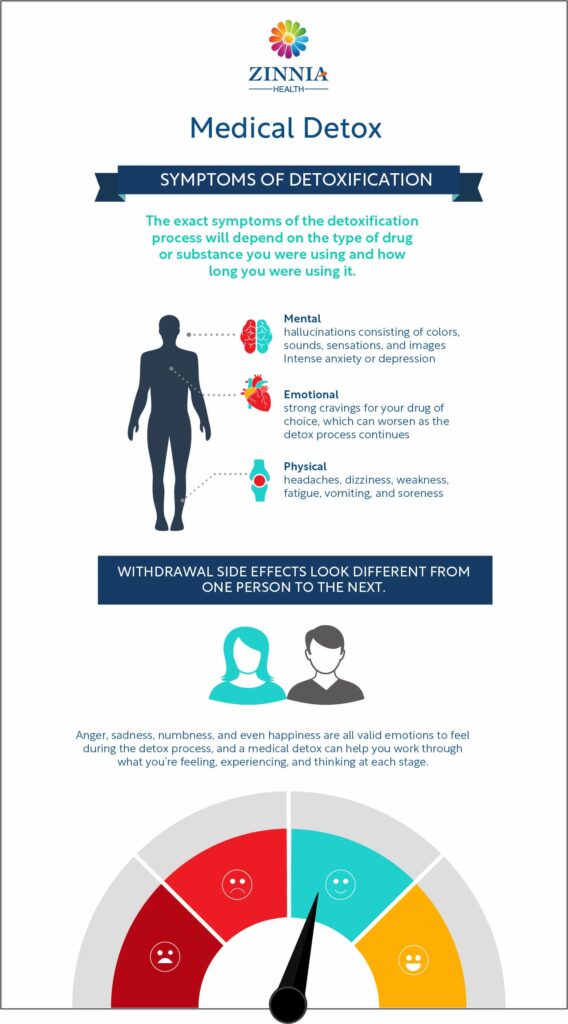Medical Detox Treatment Overview
Many people across the United States recognize that substance abuse is a disorder that requires inpatient levels of care. The medical detox process is essential to patient safety while transitioning away from the substance to get help mentally, physically, and emotionally.
While a medical detox is not the path everyone will take when recovering from Substance Use Disorder (SUD), it is a highly valuable type of treatment. Your healthcare provider might recommend it to assist in long term recovery. If you’re curious about what a medical detox is or how it works, this is what you need to know.
Find the location that works for you.

What Is the Detoxification Process?
The medical detoxification process is a type of detox program used in addiction treatment. Generally, medical detox is the first step you will take when you seek treatment for substance use disorder.
According to the National Institute on Drug Abuse (NIAA), medication should be the first line of treatment. Behavioral therapy or counseling should also be included.
Any time someone is quitting an addictive substance, they will have to go through the natural detoxification process. During the detox process, the body will learn how to function again in the absence of the substance.
The detox process can range in difficulty. This depends on:
- The potency and nature of the substance a person was abusing
- How long they had been taking it
- To what degree they were addicted to it
In fact, in cases of alcohol and benzodiazepine addiction, it can be life-threatening.
The detox process puts a strain on mental health. It may even cause dangerous side effects if attempted at home without the care of medical professionals. Substance users should undergo a supervised medical detox at an accredited detox center instead.
What is a Medical Detox?
The withdrawal symptoms associated with the natural detoxification process are not only difficult to face, but sometimes dangerous. If a medical detox is recommended, your treatment plan will have different parts. These parts are designed to help make the transition into substance abuse treatment smoother.
A medical withdrawal process may use a combination of therapies focused on behavioral health, mental health, and medical care. Some medications may be used in medical detox to help your body and mind adjust to being drug-free.
These include:
Staff closely monitors patients who receive medications during a medical detox. To make the detox treatment process easier on the mind and body, medications are provided in the smallest possible dose. As a result, patients are much more likely to succeed in the treatment process.
Medical Detox Process and Side Effects
The exact symptoms of the detoxification process will depend on:
- The type of drug or substance you were using
- How much of it you were using
- How long you were using it
The most common detox symptoms include the following.
- Mental side effects, including hallucinations consisting of colors, sounds, sensations, and images. You can also experience intense anxiety or depression.
- Emotional side effects, including strong cravings for your drug of choice. These may worsen as you get further along in the detox process.
- Physical side effects, such as headaches, dizziness, weakness, vomiting, fatigue, and soreness.
Potentially harmful withdrawal symptoms look different from one person to the next. For instance, while one person might experience severe anxiety, another might find themselves extremely irritable.
Anger, sadness, numbness, and even happiness are all valid emotions to feel during the detox process. A medical detox can help you work through what you’re feeling, experiencing, and thinking at each stage.
How Long Does a Detox Last?
The medical detox process lasts anywhere from 10 to 14 days, but the physical and mental effects of withdrawal can be felt for months. Generally, the more severe someone’s drug and alcohol addiction was, the more difficult the detox process will be.
For alcohol abuse, the standard detox period lasts 5-7 days. Meanwhile, drugs such as opiates may have effects lasting up to six months. However, the exact length of detox varies from person to person.
Using medications like benzos and tapering off the addictive substance can help reduce the symptoms of withdrawal. At a medical detox center, you’ll have a group of specially trained staff around you at all times to ensure that you’re getting the best possible drug addiction treatment.
Benefits of a Medical Detox
By using a combination of mental, behavioral, and medical interventions, a medical detox makes the symptoms of alcohol and opioid withdrawal safer and easier to face.
These types of substances are historically difficult to detox from. This is because the detox process can naturally bring about several symptoms.
These include:
- intense cravings,
- delirium,
- a rapid heart rate,
- and a myriad of severe side effects.
These effects can potentially cause or contribute to long-term medical conditions.
A medical detox may be clinically recommended if you are suffering from co-occurring disorders like mental health problems. Mental health issues can exacerbate withdrawal symptoms and long-term implications.
Compare a medical detox to a home detox where someone will try to quit “cold turkey.” Without medical professionals to help you, the symptoms of withdrawal can be overwhelming. People who try to quit on their own may end up relapsing during the detox process, as symptoms fluctuate over a period of roughly 10-14 days.
If you want to quit, but you’re struggling to stop on your own, don’t let the effects of withdrawal stand in your way of recovery. At a detox facility like Zinnia Health, you’ll be under medical supervision for your safety and comfort, ensuring your success. Get in touch with us today to learn more.
Are Outpatient Medical Detoxes Possible?
When most people picture a medical detox, they may assume that their only option for getting help is at an inpatient treatment facility. In reality, outpatient medical detox is entirely possible. In fact, it is often recommended as it can make it easier to transition back into home life, which therefore increases the chance of success for some patients.
When going over your treatment options for the detox process, remember that drug abuse treatment programs are designed for stabilization. Your chance of success greatly increases if you are not in a safe, healthy environment free of drug use.
For patients who are trying to recover, but there is often drug use going on in their home, perhaps by a loved one, an inpatient treatment center is your best option.
Here’s some more information to help you decide what’s the better fit for you.
Outpatient Drug Detox Programs
An outpatient detox makes the most sense if you have a strong, supportive family and you can safely stay at home with non-drug users who will help you through the detox process. Sedatives or other medications may be prescribed to you to help you though the mental and physical withdrawal symptoms.
Inpatient Drug Detox Programs
An inpatient drug detox program is the preferred treatment for anyone with a severe dependency, especially on opioids, as the risk of relapse or long-term implications is higher. Additionally, if you do not have a strong network of supporters and/or your home is not a safe place for you during detox, an inpatient treatment facility will be your best option.
If you’re concerned about the cost of treatment, Zinnia Health’s team of professionals can help you understand what coverage may be available to you so that expenses do not stand in your way of recovery.
Advice for Choosing a Detox Facility
Drug or alcohol detox programs may sound intimidating, but continuing your addiction is much more dangerous. When you’re ready to take the first step towards getting help, it’s critical that you find the right facility for your individual needs.
This means finding a treatment center with kind and caring nursing staff, experienced doctors, and that follows a proven pathway for treatment.
A referral is not necessary in most cases. Rather, you simply need to reach out to the drug detox center of your choice and get started. As you search for the right facility, keep the following advice in mind.
Continuing Recovery Process
Drug addiction recovery goes beyond whatever inpatient or outpatient program you enroll in. Look for a facility with support groups and accessible medical staff who will be there for you long after you’ve “finished” your treatment.
Rehab Facilities: Location + Specialties
When dealing with co-occurring disorders, such as mental health problems, prioritize a facility that specializes in mental health care.
You should also look for a facility near to where you live, as that will make it easier to continue utilizing the support groups and staff after finishing the inpatient program. For outpatient programs, choosing a nearby facility is important to getting the critical support you need during drug or alcohol withdrawal.
Customized Treatment Options
Seek out a facility that will invest time into creating a fully customized treatment plan that’s designed around your life, concerns, and goals. Beyond getting you through the detox process, the treatment facility should be prepared to help restore your health and wellness as you transition into your new life.
Detox Centers Should Involve Family
One of the most important aspects of transitioning back into life after drug recovery is being able to have healthy relationships with your loved ones. The best facilities will involve your friends and family near the latter stages of your treatment.
Confidential Drug Rehab
Confidentiality should be a top priority for all addiction treatment programs. If you feel like a facility doesn’t respect you or your privacy, quickly move on to one that does. You deserve the best care and a solid support group as you pursue treatment.
If you’re facing a crisis, the Substance Abuse and Mental Health Services (SAMHSA) hotline should be your first point of contact.
Taking The First Steps Toward Treatment
Drug or alcohol addiction treatment is not easy. You can put yourself on a path to lasting recovery with reduced risk of relapse, caring medical professionals by your side, and enough support to help you get back on track.
At Zinnia Health, we know that the road to recovery is a winding one, and we know that everyone will travel it differently. In fact, one of our top priorities is getting to know you and your struggles.
That way we can best support you in the life you live now, and the one you want to lead in the future. Are you ready to take the next step towards recovery? Reach out to Zinnia Health today to get started, call (855) 430-9439.


